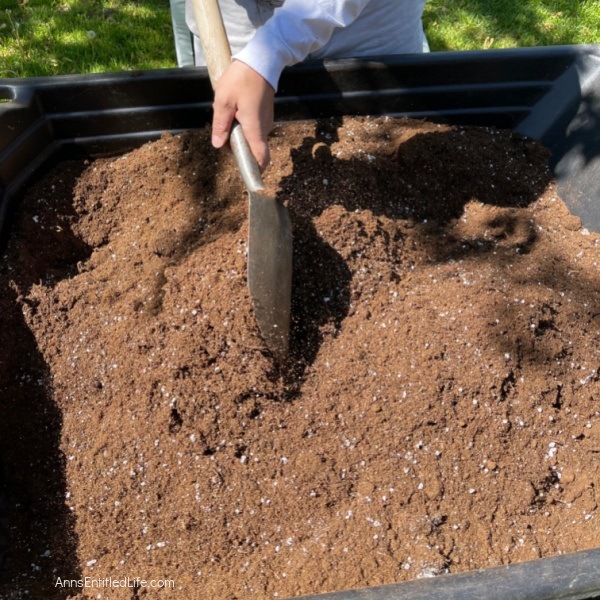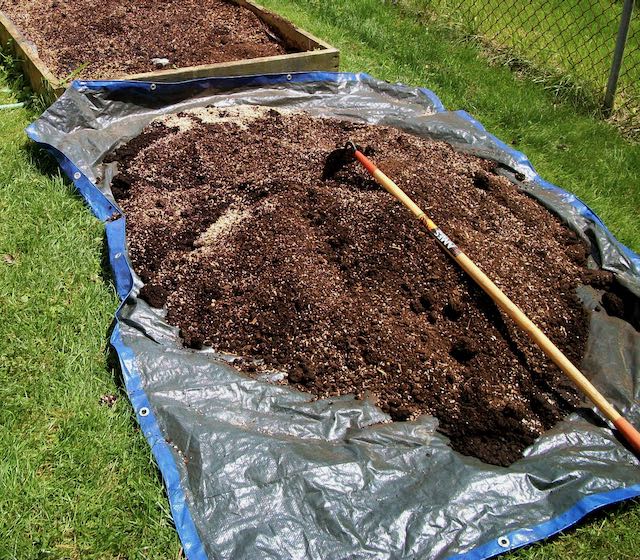What Is Gardening Soil Mix?
Garden soil mix, also known as garden soil, is a carefully blended combination of organic and inorganic materials that is ideal for growing plants. Its primary purpose is to provide plants with nutrients, drainage, and aeration. This particular soil mixture can be used in raised beds, containers, or in-ground, depending on its intended use. By understanding the appropriate soil mix and the benefits of each soil type, gardeners can enhance their plant's health.
The importance of a good soil mix in the garden cannot be overstated. The selection of soil mixture can significantly impact the success of your garden. A proper soil mix provides a sturdy foundation for strong root development, good nutrient absorption, and proper drainage. Using the wrong soil mixture can lead to stunted growth, disease and pest infestations, and lower yields. Therefore, to achieve the best results from your garden, it is essential to select the appropriate soil mix.
Using specific soil mixtures can offer several advantages, such as improving the overall health of your plants and increasing your yield. Robust root growth requires a well-balanced soil mixture. This is crucial for developing a strong root system and efficient nutrient absorption. Adequate drainage provided by the right soil mix reduces the risk of root rot and waterlogging, helping plants receive oxygen and preventing asphyxia. Additionally, the perfect blend of soil components supplies plants with the necessary nutrients for growth, reducing the need for excessive fertilization. It is evident that the proper soil mixture is critical to the success of your garden. Gardeners can encourage plant growth and root development by understanding each plant's specific requirements and adjusting the soil composition accordingly. This minimizes the use of artificial fertilizers and enhances the garden's visual appeal. The proper soil mixture is the key to developing a healthy garden and maintaining its health.
Blending the Elements of a Gardening Soil
To create a healthy and nourishing soil for your garden, you need to combine some basic ingredients like peat moss, perlite, vermiculite, and compost. Peat moss is a well-known ingredient in many gardening soil mixes because it helps to retain moisture and allows air to circulate the soil. Perlite, on the other hand, is a lightweight material that enhances drainage and protects the soil from compression. Vermiculite is another essential ingredient that helps to keep the nutrients and moisture in the soil. Finally, compost is added to the soil mixture to improve fertility and provide adequate organic matter. By blending these elements, you can create a harmonious soil that supports the development of robust plants.
It is essential to add organic matter to your soil mixture to improve its composition, consistency, and provide essential nourishment for the plants. Compost, made from animal waste and plant waste, is a valuable source of organic matter that naturally fertilizes the soil and gradually gives off nutrients to the plants. Organic matter also helps to retain moisture in the soil, which means less frequent watering. It also promotes the growth of useful microorganisms that help to liberate nutrients for plant absorption and decompose organic matter.
Anon, Available at: https://www.annsentitledlife.com/wp-content/uploads/2021/05/homemade-potting-soil-06.jpg.
The soil's texture and structure are determined by its mineral content, which consists of sand, clay, and silt. Clay particles are smaller and hold more water and nutrients, while sand is much larger and provides better drainage. Small silt particles help to improve soil fertility. These minerals are combined in the soil to create a balanced environment that is advantageous to the growth of healthy roots and plants. The presence of minerals in the soil is crucial for maintaining its overall composition and promoting a healthy soil ecosystem.
Fertilizers and amendments are essential to maintain soil fertility and promote healthy plant growth. These materials contain essential elements like nitrogen, phosphorus, and potassium that are necessary for photosynthesis, root growth, and berry production in plants. By supplementing the soil with extra nutrients, farmers and gardeners can ensure that plants obtain the required resources for strong growth and increased productivity. Organic materials like manure or compost can be added to the soil to make it richer and more nourishing.
All the elements must be present for a healthy plant to grow properly. For example, plants use photosynthesis to transform sunlight into energy, enabling them to produce their food. If plants lack essential minerals like potassium, phosphate, and nitrogen, they might have difficulty carrying out this vital function. Similarly, strong root systems are essential for plants to become established in the ground and absorb essential nutrients and water. A robust root system provides plants with the resources they need to survive and grow. Fruit production is also crucial in many plant life cycles.
The balance of elements in the soil mixture is crucial to the survival of plant species. Fruit production is heavily dependent on the creation of ideal soil conditions. Getting the right proportions of the various components in the soil mixture is essential to ensuring a solid harvest of fruit. This promotes root development, guarantees a robust yield, and provides the necessary nutrients.
Setting Up A Great Blend Of Garden Soil - Issues To Consider
When mixing soil for gardening, it is crucial to consider the type and texture of the soil. Knowing the consistency and composition of the soil is essential as different plants thrive in different soil types. Clay soils require drainage aids to prevent waterlogging, while sandy soil drains faster and may require more organic matter to improve water retention. The pH of the soil should also be taken into account, as some plants prefer acidic soils, while others prefer alkaline soils.
To meet the specific needs of plants, it is essential to choose the right soil amendment. For some plants, organic fertilizers or compost can be used to provide high phosphate or nitrogen levels. In addition, certain soil textures or pH levels are required to encourage the growth of certain plants. By understanding these requirements, you can ensure that the soil enhancements you choose are suitable for the plants you are growing.
When selecting soil amendments, it is essential to consider the pH level and nutritional requirements of the soil. For example, blueberries and azaleas thrive in soil with a pH range of 4.0 to 5.5% acidity. To reduce the pH level, soil modifications can be made by adding substances such as sulfur or peat moss. For low-nutrient plants like peppers and tomatoes, well-balanced organic fertilizers or compost can be beneficial by boosting phosphorus, potassium, and nitrogen levels. Gardeners should carefully consider their nutrient needs and pH levels to ensure optimal growth and yield.
When considering garden amendments, it is also important to consider the soil's ability to drain excess water and retain moisture. Succulents and cacti prefer moist soil, while ferns and tropical plants prefer moist soil. Gardeners can enhance soil drainage by adding substances like coarse sand or perlite, and improve water retention by adding supplements like vermiculite or peat moss. By tending to factors like pH levels, drainage, nutrient requirements, and water retention ability, gardeners can create a conducive environment for plants to grow and thrive.
Benefits of Utilizing a Gardening Soil Blend
Achieving an effective soil mix can lead to improved soil composition and productivity. It results in decreased soil erosion due to improved root development and absorption of nutrients. It also leads to improved plant health and resistance to pests and diseases, as well as enhanced growth and crop yield.
Using a balanced soil mix also extends the growing period and increases effectiveness with various plant types. It promotes improved air circulation, efficient water drainage, and prevents excessive water accumulation and root decay. This leads to better water preservation and a reduced need for regular watering. Additionally, it ensures improved pH balance, supporting ideally suited nutrient accessibility for plants, and reduces weed development and competition for nutrients.
The soil mix also promotes resistance to pests and diseases, further improving plant growth and productivity. It also conserves water, resulting in a reduced need for frequent watering. Improved air circulation and water flow prevent too much moisture and root decay, and the ideal pH balance in the soil ensures optimum plant nutrient availability. This results in a diminished proliferation of weeds, and lesser competition for nutrients.
Overall, achieving a well-balanced soil mix can result in low-maintenance gardening, improved yields, better plant growth and resistance, and sustainable water conservation efforts. The proper balance of organic matter and minerals in the soil also enables better moisture retention and less frequent irrigation, thereby retaining essential nutrients and releasing them according to the plants' requirements in a controlled fashion. This encourages rapid development and growth of plants, while minimizing the risk of overwatering and encouraging water conservation.
Making Your Very Own Gardening Soil Blend - 3 Easy Steps
Creating your own basic garden soil mix is easy with these step-by-step instructions:
1. Gather the basic materials: peat moss, compost, and perlite.
2. Mix all of the ingredients together in equal amounts in a container or wheelbarrow.
3. Thoroughly blend the ingredients until they are evenly mixed.
4. To check for excess moisture, take a small amount of the soil mixture and press it down carefully. It should not be too damp or too dry, but retain its shape.
5. If the soil is too dry, add more compost; if it is too thick, add more peat moss.
6. Once the soil mixture has reached the proper moisture level, it is ready for planting.
7. Fill garden pots, raised beds, or garden beds with the soil mixture.
Effective planting relies on using the proper soil mix, which provides the correct balance of nutrients and moisture for your plants. Taking the time to mix your own soil will lead to vibrant blooms and strong growth. Don't forget this crucial step when starting your garden.
Best Potting Mix For Container Gardens
Growing Your Own Vegetables In Containers
Grow Potatoes In Containers?
Growing tomatoes in Containers
What To Know About Container Gardening
Links:

